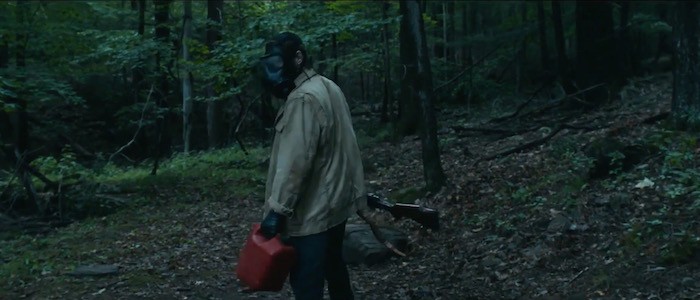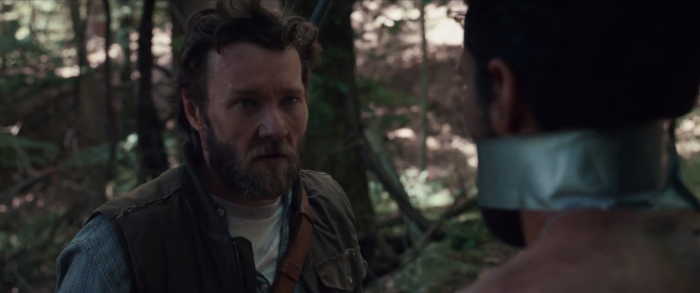'It Comes At Night' Director Trey Edward Shults On How 'The Shining' Inspired His New Cinematic Nightmare [Interview]
It Comes at Night opens this week and it brings a blast of unsettling, arthouse horror into the stifling summer movie season. Well, "blast" may not be the right word – this is a patient, uneasy, and downright creepy movie that deliberately avoids offering instant satisfaction or clear answers. This approach only makes the film more upsetting.
And writer/director Trey Edward Shults wouldn't have it any other way. Like his previous film, the micro-budgeted drama Krisha, Shults has made a very personal film here, albeit one set in the post-apocalypse that follows two families sharing one roof in the woods while a virus destroys civilization elsewhere. Speaking with Shults, he was open about his influences (everyone from Stanley Kubrick to John Cassavetes), writing a horror movie as therapy, and plunging the audience into a nightmare.
One of the things I love about this movie is that it really does treat the audience as a pure observer. It just drops you into this world without much set-up or any definitive answers and forces you to feel your way through the situation. Did you start off with a complete picture and take pieces away or did you begin with a mystery and not answer it deliberately?
That's a good question. With this one, I think I jumped into it as the audience would. The way it's written is the way I jumped into it. I let it spew out of me. Also, it stemmed from something super personal, so it started from that and spewed out from there. I don't build out this whole, huge world and start writing. It comes from this personal, little space and let it build out. And then I have my logical reasons for everything else, but I intentionally keep stuff out.
You've said before that this was inspired by the death of your father. The film is this incredibly sad and mournful thing full of anger and distrust. Was this like therapy for you? How did you channel those feelings?
My stepdad and my mom are both therapists and I wrote this two months after I lost my dad and I do think it worked as an act of grief and processing that grief. It was cathartic. But now it's weird, because now I've made the movie and that was years ago. I had a weird relationship with my dad and he battled addiction and I hadn't seen him in ten years and then I was with him on his deathbed. He was so full of regret and he didn't want to let go and I was just trying to help him find some kind of peace. What I said to him was what Sarah says to her dad at the beginning of the film. Two months later, I just started writing. I don't know why. And this whole story spun out of that. It's obviously fictional, but it was that emotion and headspace and processing and dealing with my fears, basically. All of my years are in this movie. The biggest one of all is mortality.
 There's a long history of movies set in the post-apocalypse. Were there any touchstones that influenced you in a major way?
There's a long history of movies set in the post-apocalypse. Were there any touchstones that influenced you in a major way?
Actually, I don't think it was ever post-apocalyptic movies. The one of those that I love to death is Children of Men, but I don't think I've seen a lot of them. People bring up The Walking Dead, but I've never seen that. For me, it was other horror movies and other movies I love. It would be stuff like The Shining and Night of the Living Dead, but combined with [John] Cassavetes and [Paul Thomas Anderson]. Just totally different places and things I love combined with the personal aspect. That's what it came from. I hope it is a unique movie and something we haven't seen before. Thinking on it in hindsight, with Krisha, it was a family reunion story. It's been done to death. It's the most boring set-up you can do. But within that, I think we created something unique. I hope this movie is the same way. A contained, post-apocalyptic thing. It's been done a lot. But it comes from such a personal place and the two just came together and I just had faith that this would be different. I just believed in it. I hope it feels that way.
I'm glad you mentioned The Shining, because that's something I wanted to ask you about. Correct me if I'm wrong, but you seem to obscure the geography of the house where the bulk of the film takes place. It reminded my of the impossible layout of the Overlook Hotel. Was that intentional?
One hundred percent. We never help establish the geography of the house at all. It's especially playing with darkness and everything. That's different from The Shining, because The Shining is [brightly] lit and everything. I always saw the house as this kind of labyrinth, the mesh of Travis' head, if that makes sense in a pretentious way. And past that, I would see the house metaphorically, as a microcosm for this society and these two tribes. Just two families, you know what I mean? The house is so huge me. Also, since we're dealing with nightmares and headspace and stuff, I never wanted it to be super clear "This is where this is and this is where this is." The Shining was a huge touchstone for that. The Overlook is the best ever in any movie.
Throughout the movie, you manipulate the aspect ratio to represent whenever a character is having a nightmare. I think it had the intended effect, because every time the screen starts to narrow, I started to get tense. And then, at one point in the movie, the aspect ratio changes and it just...stays there. It definitely feels like you're trapped in a nightmare.
That was always the intent! My theory on it was, by the end of the movie, nightmare and reality are one. Reality has purely become a nightmare. The worst thing that can happen has happened and now we're just stuck in it. All of the nightmare sequences are with anamorphic lenses and different aspect ratios. By the end of the movie, it's all intermeshed. The same thing happens with music, too. The music cues are happening only in nightmares until there's a spot here and a spot there. And then at the end, the nightmare soundscape and the reality soundscape have become one and merged together.
The movie doesn't lean on easy scares. There's nothing jumping out at you. It's all tension and build-up, like you're being strangled for 90 minutes.
[Laughs] That's great. That's awesome.
Was there ever the temptation to add scares? I know adding some more obvious jolts probably could have helped you get more money to get it made.
One thing about it...that personal place it came from and that personal place it spewed out from...I always wanted to retain that from beginning to end. I think it did reach a space where I was like "Huh, I wonder if I could do this stuff and get a bigger budget and make a more conventional kind of thing." But at the end of the day, it just wasn't me. This is more what I love. This is sort of unrelated, but I had a call with a French press guy and he was like "Do you think people are going to be mad that it's not a conventional horror movie?" And I was like "Yeah, I don't know. Probably." And he said "Would you be offended if it was called an intellectual horror movie?" And I said "No, that sounds cool!" I don't know! That sounds right to me. I resisted the temptation. I don't want to do anything that's different from the essence of the story and what it's about thematically and what this story really means and I'm always going to stay true to that and where it leads me.
I want to talk about Joel Edgerton. He's one of those dependable actors – he shows up on screen and you know he's going to get the job done.
Exactly.
 Since your first movie was cast predominately with family members who you already knew well, what was it like working with an established talent, a person who is going to have his own perspective and dynamic that informs how he works and approaches a role?
Since your first movie was cast predominately with family members who you already knew well, what was it like working with an established talent, a person who is going to have his own perspective and dynamic that informs how he works and approaches a role?
I learned a lot. It was cool to see different actors and different approaches. Joel's craft in particular, he's an incredible actor. He's also a writer and director and he has that mind. His input, 99 percent of the time, if he has input or a thought on something, it's great and spot-on. Every take he does, he'll give five different, subtle variations that can be shaped and work in different ways. I learned so much from him. I think he's really brilliant. Also, he does a lot of nuanced roles where he doesn't get the credit he deserves. He's amazing.
We have a series on the site on the site where the staff answers a question related to an upcoming movie and we'd like to do one tied into It Comes At Night.
Sure!
What is your favorite cinematic end of the world?
Film or TV show?
Either, if you like. And take that "end of the world" as literally or as metaphorically as you'd like.
I think...is three answers okay?
Yeah, go for it!Children of Men. Take Shelter, depending on how you want to look at it. Melancholia, [also] depending on how you want to look at that. I also love the video game The Last of Us. I think that video game is incredible. Those would be the four, especially if I'm thinking of any kind of end of the world thing. With Children of Men and The Last of Us, I just love the world they create. I think they're really smart and unique worlds, but I also care about the characters. But then with Take Shelter and Melancholia, it's like taking an emotion and applying that to a narrative. With Melancholia, it's depression. With Take Shelter, it's [director Jeff Nichols'] paranoia about where the world is going. They distill that emotion and let a narrative come out of that emotion. It's fascinating to me.
***
It Comes at Night hits theaters on June 9, 2017.
